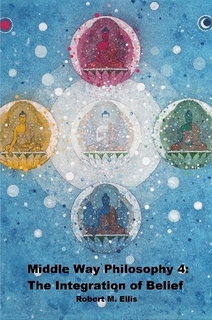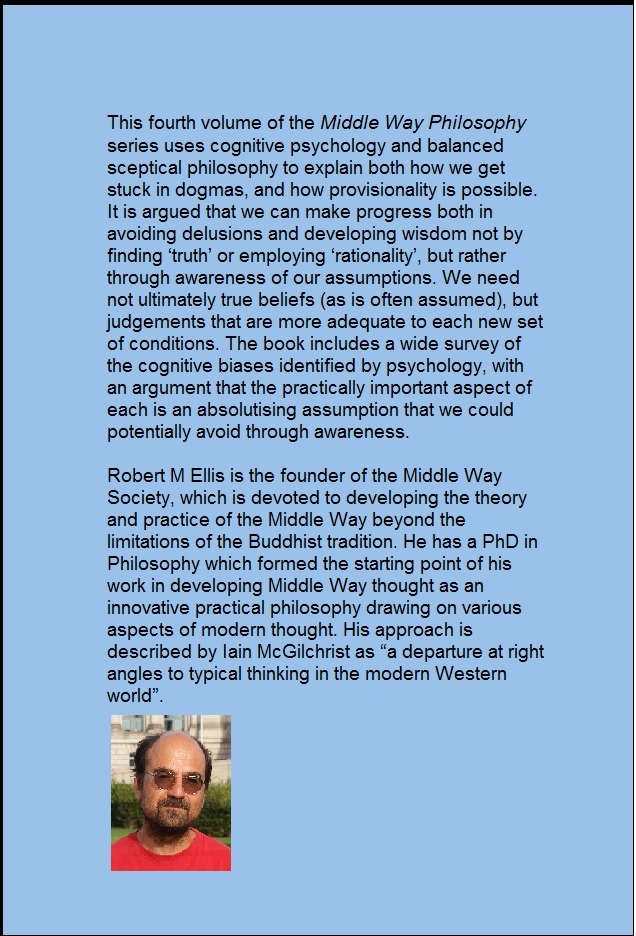Dismissiveness is the armour plating we use to keep out challenging alternatives to our dominant beliefs. Some dismissiveness is rude, but most of it consists of a polite brush-off or excuse for not engaging with something. There are plenty of rationalisations for being dismissive: we don’t have time for that, and we just want to get on with it (whatever ‘it’ is). When trying to discuss Middle Way Philosophy, I’ve met such responses many times. Of course, our time, attention, and capacity to engage with new ideas really is limited, so is dismissiveness unavoidable? As always, I think there is a Middle Way that respects those conditions, and is not afraid to make a practical judgement not to engage with something that is unlikely to be fruitful, but is nevertheless more open to new ideas than we often are.
Too often, instead of trying to strike a balance in their judgement, with clarity about their reasons for not engaging with something, people seem to rely on conventional credibility. This often comes down to how many other people are listening, but there are also conventional markers of academic credibility (has she published in peer reviewed journals etc?) or professional credibility (does she have a senior post?). Those who despair at the mass of ‘equally valid’ opinion on the internet and desperately want some certainty to hold onto are all too likely to rely completely on such criteria. But academics and professionals are likely to be highly specialised – which often means that they can provide accurate detailed information, but that their wider judgements will be skewed towards the assumptions of their narrow discipline. For that reason, many academics have off-hand dismissiveness down to a fine art. One of the encouraging aspects of the avalanche of views and ideas that is the internet is that – amongst the conspiracy theories and other rubbish based on narrow assumptions – the voices of synthesis are sometimes able to break through with wider perspectives than the specialists can offer us. Wikipedia is a wonderful example of this: generally more reliable on average than the specialist paid-for encyclopedias, because it is the product of a continuing exchange of views, rather than one view of a specialist who thinks he knows it all and never questions his wider assumptions.
The realistic, discriminating alternative to dismissiveness, I think, particularly involves two key criteria. I’ve developed these from thinking about the philosophy of science more than anything else:
- Considering the purpose of a theory in its context
- Comparing it to alternative theories rather than absolute criteria
All too often people seem to think of theories as ‘true’ or ‘false’, but as embodied beings with very limited perspectives we are usually in no position to assess theories as true or false. An implicit assumption that a theory must be false just because it is new to you seems to often be at the root of dismissiveness. Instead of thinking of it as true or false, we need to ask what function the theory fulfils. For example, a new theory about beetles has a very specific function within entomology, and probably few implications beyond it. One of the main problems I encounter with people’s dismissals of Middle Way Philosophy is that they make hasty assumptions about its purpose, often depending on where they encountered it. For example, if they encounter it in a debate about science they assume it’s a scientific theory, in a debate about ethics an ethical theory etc. But its purpose is actually to synthesise these approaches, not just to fulfil the more restricted purposes of one or the other. It thus needs to be judged on how well it addresses the conditions of science, ethics, religion, art, spiritual practice etc, in relation to each other, rather than of one more narrowly conceived.
If I don’t think a particular idea looks set to fulfil the purpose it aims to fulfil (usually because of the assumptions it makes) then I feel justified in devoting no further time to it and starting to look elsewhere. For example, conspiracy-theory based approaches to politics, which concentrate on blaming particular groups (bankers, conservatives, reptilians) for all our ills, are not fulfilling the purpose of political theory as I understand it, which is to help provide practical solutions on which sufficient agreement could be reached to start addressing our social and political problems.
The other element of dismissiveness is based on selective scepticism. It’s always possible to come up with some element of a theory that is insufficiently justified, since no theory created by humans is ever likely to be perfectly justified. But dismissiveness often involves picking on one particular problem with a theory and using it as an excuse to dismiss it, even though that problem hasn’t been looked at in context and the theory hasn’t been compared to alternatives. The nirvana fallacy is the tendency to implicitly compare a given theory to an absolutely perfect model of a kind that doesn’t exist in experience. Instead, to be realistic every judgement needs to be a comparative judgement. If you don’t like this theory, do you have a better one that addresses the same purposes better? Iain McGilchrist’s theory of brain lateralisation seems to be a constant target of dismissiveness due to the nirvana fallacy. People object that its account of such a complex matter as the brain must be over-simplified, but the only established alternative to the language of left and right hemispheres is the assumption of the unified self, which is hugely inadequate by comparison. Brain lateralisation is incredibly fruitful in synthetically explaining a wide range of phenomena in relation to each other, from cultural changes to mental illnesses, as well as potentially supporting an ethical model. The unified self theory has had many centuries to explain these things and failed to do so adequately.
Again, I do think it is justifiable not to give further time and attention to ideas that may be entirely coherent in themselves, but address conditions that can be much better addressed elsewhere. For example, I appreciate the positive motives behind Christian theology, and I have studied it to some extent (in fact my first degree subject has ‘theology’ in the title, despite the fact that it wasn’t central to my interests even then), but I give little attention to it these days, because I have concluded that an approach to issues of spirituality, ethics etc. that starts with the revelatory authority of God is likely to be less effective at actually bringing about ethical and spiritual development than one that starts with an integration model. But one needs to have some idea what the better alternative is and why, rather than only relying on conventional answers.
So, of course we need to make judgements about where to bestow our attention. However, dismissiveness is not inevitable. Avoiding dismissiveness whilst moving on is not simply a matter of being gentle and kindly about it (though that obviously helps too), but of having good reasons for doing so that relate to experience, rather than implicitly appealing to some absolutely right model that you instantly assume you have and the other person doesn’t have. If you get chance to explain your reasons in terms of the purposes of the theory concerned and in terms of having better alternatives, that offers no guarantee that the other person won’t take offence at your lack of attention to their ideas, but it does raise the probabilities of everyone being able to move on in a helpful direction.
Picture: ‘You aren’t listening’ CCSA 2.0 by Jesslee Cuizon (Wikimedia Commons)




